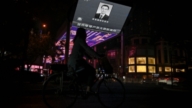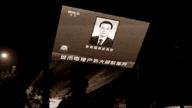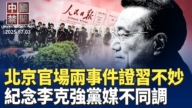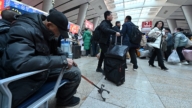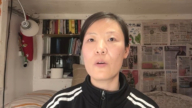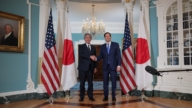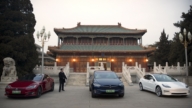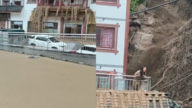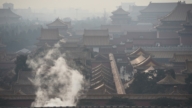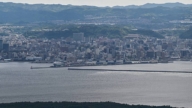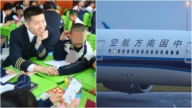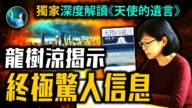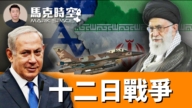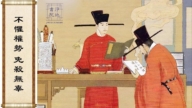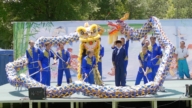【新唐人2014年01月16日讯】日本首相安倍晋三参拜“靖国神社”后,近半个月来,中共发动40多名驻外大使,在国际上掀起了一场轰轰烈烈的舆论战,连番批驳“军国主义”是日本不断作祟的所谓“伏地魔”。但评论认为,中共前政法委书记周永康被传出事的同时,中共热炒安倍参拜一事,目前是转移人们的视线。
2014年10月北京将举行APEC峰会,中共声明,不欢迎上个月参拜“靖国神社”的日本首相安倍晋三。接着中共官方媒体,以及中共驻外大使,对安倍的嘲讽和谩骂也逐步升级。
中共喉舌统计,截至1月13号晚,包括驻联合国代表、驻欧盟使团团长、驻多国大使、代办、驻多地总领事、特派员等在内,共计有43名中共驻外大使,连番批驳参拜“靖国神社”的安倍晋三。
《京华时报》的报导说,截至11号,中共驻外大使共有40多人次,通过接受当地媒体专访、或约见当地媒体主要负责人,或召开专门座谈会、举行媒体吹风会、和在公开场合表态等方式,在驻地国声讨安倍晋三。
北京时政观察人士华颇分析,中共让这些驻外大使,以当地人的语言发声,从而掀起的这场轰轰烈烈的舆论战,是变相的游说美国及西方政府“提防日本”。
北京时政观察人士华颇:“其意就是想让各国,唤起各国对日本在二战时候的所作所为的记忆,那就是要提防日本,提醒美国及西方不要一味的纵容日本,不要让日本把日本身上那些枷锁全部去掉,那就是如果把日本这只虎放出来之后,西方也会倒霉的。”
这场波及全球的舆论战,最先是由中共驻英大使刘晓明发起。他在英国《每日电讯报》刊文时,借用英国作家JK罗琳在《哈利•波特》中塑造的恶魔,谴责日本是书中的“伏地魔”。接着,中共外交部发言人华春莹也在记者会上批驳日本“魔性难改”。
日本驻英国大使林景一随即在《每日电讯报》回应说,安倍晋三参拜“靖国神社”意在表达日本的和平意图,“不是向战犯表示敬意,也不是为了赞扬军国主义。”
他表示,真诚的希望中共能开启两国领导人之间的对话,而不是老拿70年前的、早已不复存在的“军国主义”的阴魂说事。
时事评论员林子旭:“如果说真的要在人类历史上选出伏地魔的代表,那应该是共产党和法西斯政权了,见到法西斯和共产党,或许伏地魔心里都要打颤的,我相信任何法西斯军国主义的死灰复燃,都不是爱好和平的人希望看到的。”
台湾《联合报》认为,中共把这波“舆论战”扩大到全世界,是奇招。报导说,这是由曾驻日本大使的“日本通”,和中共外交部长王毅策画,借安倍参拜一事,来突显日本窃取钓鱼岛的事实。
自2012年9月,钓鱼岛被日本“国有化”后,中、日争端愈演愈烈,除了各自加强警备、强化军队外,去年10月,中共还在东海划设了“防空识别区”,令中、日矛盾进一步激化。
时事评论员林子旭认为,这波“舆论战”表面看,可以解读为中共对日本政策有些变化,背后深层原因是中共想转移视线。
林子旭:“目前周永康出事儿的消息传的满天飞,中共内部打得不可开交,中共的各种丑闻伴随着权斗纷纷释放出来了,中共非常不希望老百姓把关注的焦点集中到自己这里,这个时候日本首相参拜靖国神社,正好给中共提供了一个转移视线的机会。”
林子旭表示,说白了,中共还是在利用民族情绪,发动全球造舆战,把人们的注意力都转移到日本人身上,中共好从中喘口气。
采访编辑/李韵 后制/李勇
Communist Regime Calls Japan PM The Voldemort
Since Japanese Prime Minister Shinzo Abe visited the
Yasukuni Shrine, more than 40 ambassadors from the
Communist regime in the international community
have conducted a vigorous propaganda war against Japan
for almost two weeks.
They claim militarism is the Voldemort of Japan.
However, commentators believe this heated debate about
PM Abe’s visit to the Yasukuni Shrine is to divert
attention away from the CCP and Zhou Yongkang’s case.
For the upcoming 2014 APEC summit in Beijing, the Communist
regime has claimed, “Chinese people do not welcome him."
The sarcasm and invective comments from the regime’s media
and ambassadors have also escalated.
The regime-led media reported that as of January 13, a total of
43 Chinese Communist ambassadors have issued criticism of
Japanese PM Abe’s visit to the Shrine.
They are the Communist regime’s UN representative,
Head of Mission to the EU, multinational ambassador, agencies,
consul general, and Commissioner.
Beijing Times reported that, as of the 11th, more than 40 CCP
ambassadors denounced Abe in the resident country in
local media interviews, forums, media briefings, and public
appearances.
Beijing political observer Hua Po analyzes the propaganda war
of the CCP in local languages as a disguised form of lobbying
to Western governments: “beware of Japan".
Hua Po says “It is to summon up memories of Japan’s actions in
World War II to caution the West not to blindly condone Japan,
and not to remove the shackles on Japan.
Otherwise, once this tiger is released,
the West will suffer the consequences."
This global propaganda war was first initiated by China’s
ambassador to Britain, Liu Xiaoming, who wrote an op-ed
in The Daily Telegraph describing Japan as the villain Lord
Voldemort in the Harry Potter series by J.K. Rowling.
The regime’s Foreign Ministry spokesperson Hua Chunying
also denigrated Japan in a press conference.
Japan’s ambassador to Britain, Keiichi Hayashi, replied in
another Telegraph op-ed that Mr. Abe’s shrine visit was meant
as a statement of Japan’s peaceful intentions
“and by no means to pay homage to war criminals or
to praise militarism."
Hayashi expressed his sincere hope that dialogue between
two leaders “will come forward, rather than keep invoking
the ghost of ‘militarism’ of seven decades ago,
which no longer exists."
Commentator Lin Zixu: “The real representatives of Voldemort
in human history, if ever to be elected, should be the communist
and fascist regimes.
Perhaps even Voldemort would tremble seeing the fascists
and communists.
I don’t think any peace-loving people want the resurgence of
fascist militarism."
Taiwan’s United Daily News reported this global propaganda
war of the CCP as a strategy organized by Chinese experts on
Japan and the Chinese Foreign Minister Wang Yi to highlight,
by the debate, how Japan had seized Diaoyu Island.
Since the nationalization of Diaoyu Islands by the Japanese in
September 2012, the two countries’ dispute has intensified.
As well as the enhanced guards and military forces on both sides,
the Communist regime has also unilaterally declared an
Air Defense Identification Zone to further intensify the conflict.
Commentator Lin Zixu interprets the propaganda war as a
shift in the Communist regime’s foreign policy to Japan,
with the underlying purpose of diverting attention.
Lin Zixu: “The constant gossip on Zhou Yongkang’s case,
the struggles within the CCP Central,
the exposure of a variety of scandals have drawn people’s
attention to the CCP against its wishes.
The Japanese PM’s visit to the Yasukuni Shrine serves as
an opportunity for the CCP to divert attention away from itself."
Lin Zixu says that, plainly, the CCP employs national sentiment
to engage the world in this propaganda war and
to shift the focus to Japan so that the CCP gets relief.
Interview & Edit/LiYun Post-Production/LiYong


